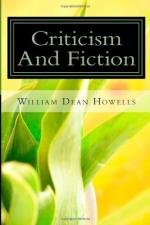If this should happen to be true and it certainly commends itself to acceptance—it might portend an immediate danger to the vested interests of criticism, only that it was written a hundred years ago; and we shall probably have the “sagacity and industry that slights the observation” of nature long enough yet to allow most critics the time to learn some more useful trade than criticism as they pursue it. Nevertheless, I am in hopes that the communistic era in taste foreshadowed by Burke is approaching, and that it will occur within the lives of men now overawed by the foolish old superstition that literature and art are anything but the expression of life, and are to be judged by any other test than that of their fidelity to it. The time is coming, I hope, when each new author, each new artist, will be considered, not in his proportion to any other author or artist, but in his relation to the human nature, known to us all, which it is his privilege, his high duty, to interpret. “The true standard of the artist is in every man’s power” already, as Burke says; Michelangelo’s “light of the piazza,” the glance of the common eye, is and always was the best light on a statue; Goethe’s “boys and blackbirds” have in all ages been the real connoisseurs of berries; but hitherto the mass of common men have been afraid to apply their own simplicity, naturalness, and honesty to the appreciation of the beautiful. They have always cast about for the instruction of some one who professed to know better, and who browbeat wholesome common-sense into the self-distrust that ends in sophistication. They have fallen generally to the worst of this bad species, and have been “amused and misled” (how pretty that quaint old use of amuse is!) “by the false lights” of critical vanity and self-righteousness. They have been taught to compare what they see and what they read, not with the things that they have observed and known, but with the things that some other artist or writer has done. Especially if they have themselves the artistic impulse in any direction they are taught to form themselves, not upon life, but upon the masters who became masters only by forming themselves upon life. The seeds of death are planted in them, and they can produce only the still-born, the academic. They are not told to take their work into the public square and see if it seems true to the chance passer, but to test it by the work of the very men who refused and decried any other test of their own work. The young writer who attempts to report the phrase and carriage of every-day life, who tries to tell just how he has heard men talk and seen them look, is made to feel guilty of something low and unworthy by people who would like to have him show how Shakespeare’s men talked and looked, or Scott’s, or Thackeray’s, or Balzac’s, or Hawthorne’s, or Dickens’s; he is instructed to idealize his personages, that is, to take the life-likeness out of them, and put the book-likeness into them.




